Indexing & Abstracting
Full Text
Research ArticleDOI Number : 10.36811/ijbm.2019.110005Article Views : 2484Article Downloads : 16
Evaluation of the awareness regarding denture disinfection in rural Indian population
Gauri Vanjari1, Khushi Bhavsar2, Rucha Kulkarni2, Hiral Bulsara3 and Gabriela Fernandes4*
1Yogita Dental College and Hospital, Khed, Ratnagiri, India
2Krishna Institute of medical sciences, School of dental sciences, Karad, Satara, India
3Bhartiya Vidhyapeeth dental college and hospital, Navi Mumbai, India
4Department of Oral Biology, School of dental medicine, SUNY Buffalo, Buffalo, New York, USA
*Corresponding author: Dr Gabriela Fernandes, Department of Oral Biology, School of dental medicine, SUNY Buffalo, Buffalo, New York, USA. Email: gfernand@buffalo.edu
Article Information
Aritcle Type: Research Article
Citation: Gauri V, Khushi B, Rucha K, et al. 2019. Evaluation of the awareness regarding denture disinfection in rural Indian population. Int J Biol Med. 1: 37-44.
Copyright:This is an open-access article distributed under the terms of the Creative Commons Attribution License, which permits unrestricted use, distribution, and reproduction in any medium, provided the original author and source are credited. Copyright © 2019; Gauri V
Publication history:
Received date: 12 February, 2019Accepted date: 19 February, 2019
Published date: 20 February, 2019
Abstract
Despite recent development and research in the field of prosthodontics, partial and complete dentures are the most sought after treatment for the rehabilitation of the lost dentition. However, little is known with regard to the patient’s knowledge, awareness and experience of denture cleansers. The success of the denture depends not only on accurate clinical and technical procedures carried out by the dentist but also on denture hygiene care practices followed by the patients. When an acrylic denture is placed in the mouth, a pellicle of glycoprotein develops that eventually becomes contaminated with oral debris and microorganisms. This renders the denture with an unpleasant taste and odour over time. Moreover, it favors the growth of candida microorganism in the denture, thereby leading to mucosal irritation. Denture care is, therefore, an imperative step to maintain denture quality, aesthetics, and longevity to ensure good oral health status. Hence, the basic objective of this study was to investigate awareness and knowledge about denture cleansers among patients wearing dentures.
Keywords: Dentures; Denture hygiene; Denture cleaning aids; Survey
Introduction
It is often said that “Oral health is the window to overall health”. With increasing life span, the number of people using dentures is on the rise. The health of these edentulous patients is majorly influenced by the hygiene of the dentures that they use [1]. Dentures, just like natural teeth, need proper care and maintenance. They should be kept as clean as possible to avoid further loss of any more teeth, or have inflamed gums or bacterial and fungal infections [1]. Inability to comply with sound denture cleanliness practice can promote the development of plaque on dentures that provide a flourishing domain to pathogenic living beings [1].
Proper cleaning of dentures is important to minimize the build-up of bacteria [2,3]. The gums and tissues in the mouth are vulnerable to the effects of food particles, germs and infection [2]. The microorganisms cause harm to oral tissue in a way through metabolic results and exotoxins in the stores [2]. Denture plaques can also move towards becoming calcified if not cleaned completely to be easily stained by tobacco, tea, and certain medications thus leading to compromise on esthetics and odour issues from dentures [4].
To ensure that dentures are free of plaque and calculus, patients are usually instructed on denture hygiene practice. Keeping dentures clean, is part of a good oral health care regimen that saves further risk of unwanted procedures down the road. The awareness about denture disinfection has been studied at length amongst dental professionals and other health care providers [5]. However, the role of daily disinfection carried out by patients themselves is crucial and cannot be ignored. Hence, a study was planned in order to evaluate the awareness, knowledge and practice of denture disinfection in rural Indian setting.
Materials and Methods
With an intention to evaluate the awareness about denture disinfection in rural Indian population and to study the practices carried out by them in order to maintain the hygiene of their dentures, a cross-sectional study was conducted in a rural setting in Maharashtra over a duration of 3 months from August 2018 to November 2018 involving 45 participants. Inclusion criteria included patients wearing dentures, willingness to participate in the study and in good physical and mental condition. A questionnaire containing 10 questions was administered. The interviewer physically visited individual households in the setting, explained the study and acquired informed valid consent from the participants. If willing, administered the questionnaire. The respondents were asked to tick the most appropriate answer from the given list of answers. Filled questionnaire were collected and information regarding the importance of use of denture disinfectants was given to the participants.
Results
The summary of the results are described in table 1 (the graphs are representative of the number of responses received.). Most of the patients cleaned their dentures (97.77 %), in which, a majority of them did it only once a day and a few of them (15.5%) claimed to do it twice a day. When asked if they knew about denture disinfection, none of them had a good knowledge about it. 55.55% said that though not much, they knew a little about denture disinfectants. None of them were aware of more than three brands, whereas 75.55% did not know even one. Next question was to know if they visited their dentist for the evaluation of the hygiene of their denture. Only 8.89% of the total participants claimed that they scheduled regular visits to their dentists to evaluate the hygiene of their dentures. 91.11% never turned up at the dental office after the delivery of their dentures. 48.89% felt the need to have proper denture disinfectants for maintaining the hygiene of their denture. None of them (0%) possessed any information about the composition of the available denture disinfectants. Only 6.67% were aware about the critical importance of cleaning dentures. 51.11% felt that they were able to clean their dentures properly whereas 48.88% were still unsatisfied .88.88% said that their dentist never told them about the necessary precautions and care.
| Table 1: Questionnaire administered to evaluate awareness about denture disinfection. | ||
|---|---|---|
| Sr. no | Questions along with choices | Response |
| 1. |
Do you clean your dentures? • Yes • No |
97.77% 2.23% |
| 2. |
How often do you clean your dentures? • Everyday twice • Everyday once • Every alternate day • Not certain |
15.57% 71.11% 6.66% 6.66% |
| 3. |
Do you know about denture disinfectants? • Yes, very much • Yes, but a little • Not at all |
0% 55.55% 44.45% |
| 4. |
How many brands of denture disinfectants do you know? • Three or more • Less than three • None |
0% 24.45% 75.55% |
| 5. |
Do you visit your dentist for evaluation of your denture hygiene? • Yes • No |
8.89% 91.11% |
| 6. |
What are your views about having proper disinfectants for cleaning of dentures? • It is a must • Not needed |
48.89% 51.11% |
| 7. |
Do you know composition of denture disinfectants? • Yes • No |
0% 100% |
| 8. |
Are you aware about the advantages of cleansing dentures? • Yes • No • Somewhat |
6.67% 24.45% 68.88% |
| 9. |
Do you feel you can clean your dentures properly? • Yes • No |
51.11% 48.89% |
| 10. |
Has a dentist or his/her staff ever shown you or told you how to clean dentures? • Yes • no |
11.12% 88.88% |
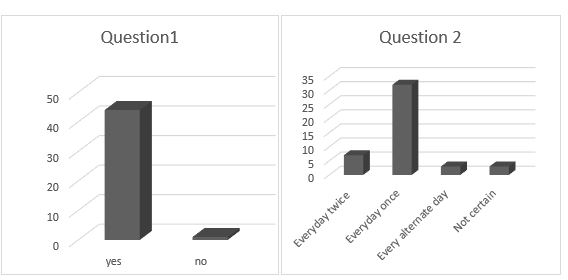
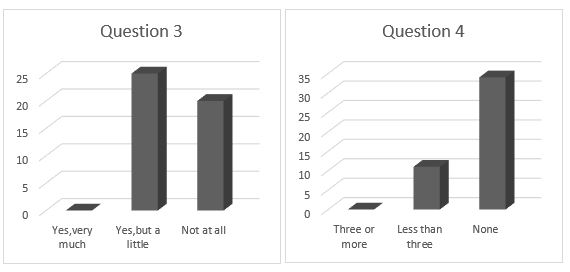
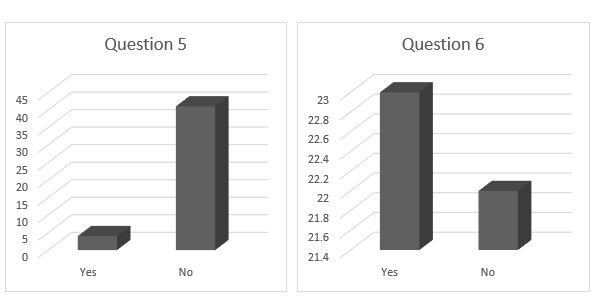
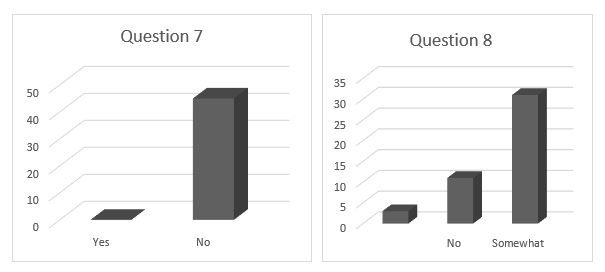
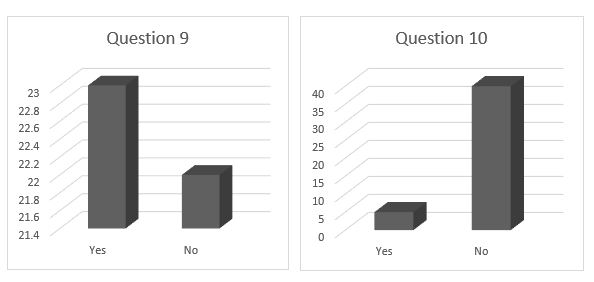
Discussion
Proper denture care is important for both the health of the dentures and the mouth [6,8]. One of the commonest ailments prevalent among geriatrics are those associated with partial or complete denture use [2,9]. Hence the dentist plays a significant role in executing the rehabilitation procedure. In addition to this, the dental practitioner or the specialist dentist has to chart out a review and maintenance protocol for the rehabilitated patients to prevent any post treatment complications or sequelae [10]. Most of the partial denture or complete denture patients leave the dental clinic with little or no knowledge of maintenance of their dentures [11,12]. This could be attributed to dental practitioner’s failure to adequately educate the patient regarding the availability of different methods of cleansing /disinfecting dentures, the post insertion complications and systemic implications of a poorly maintained dentures. This scenario is widely prevalent due to dentist unawareness of the different disinfecting techniques, lack of quality time for individual patient care, patient’s inability to implement the disinfection and patient’s negligence of maintaining denture hygiene.
The main objective behind carrying out this study was to assess the knowledge of denture disinfection among denture wearers and their attitude and approach towards the same. A good response was seen as far as cleaning dentures was concerned where majority of the participates claimed to clean their dentures but when asked about its frequency it was seen that majority of them did it only once a day and a few of them (15.57%) claimed to do it twice a day. In a study carried out by M Namrata [13] et al in 2007 it was seen that 39% of the participants cleaned their dentures twice a day and only 15% once per day. In our study, some of the participants (6.66%) did not clean their dentures daily and an equal number were uncertain about it. When asked if they knew about denture disinfectants,55.55% said they somewhat knew about it but it was thoroughly disappointing to know that absolutely nobody claimed that they had a good knowledge about it. Visiting dentist for evaluation of dentures is a vital protocol that needs to be followed by every denture wearer for ensuring the health of their oral cavity and also the dentures. 91.11% participates never visited the dental office after the delivery of their dentures. 51.11% did not find it necessary to have denture disinfectants at their residence and none of them wwere aware about the composition. 68.88% said that they were somewhat aware about the advantages of cleansing dentures. Only 51.11% felt that they were able to clean their dentures properly. In our study, when asked if they acquired information from their dentists or his/her staff about the care and precautions to be taken while using dentures, 88.88% said that their dentist never informed them about the necessary precautions and care, whereas in a study carried out by M Namrata [13] et al in Tamil Nadu it was found that 45% of the patients received the following instructions. The above mentioned results can be because of lack of awareness among patients being in rural area or due to improper instructions given to them after the insertion of denture by the dentists or his / her staff.
Conclusion
Within the limitations of this study it is clear that:
• There is lack of awareness amongst the denture wearers about maintaining the hygiene of their dentures.
• They have no knowledge about various ways of disinfecting their dentures.
• Very few denture wearers are aware about denture disinfectants.
• Awareness needs to be created amongst denture wearers and the general population about importance of maintaining oral hygiene and regarding the necessary care to be taken in order to protect their dentures and disinfect them.
• They must be made aware of the available denture disinfectants and methods to use them.
• As a dentist, it is our prime duty to educate the mass population and to create awareness among them in best possible ways including media, posters and health talks.
• Further studies need to be conducted on larger population sizes.
References
- Kreher JM, Graser GN, Handelman SL. 1991. Table 1: Questionnaire administered to evaluate awareness about denture disinfection.Eisenberg AD. Oral yeasts, mucosal health, and drug use in an elderly denture-wearing population. Special care in dentistry: official publication of the American Association of Hospital Dentists, the Academy of Dentistry for the Handicapped, and the American Society for Geriatric Dentistry. 11:222-226.[Ref.]
- Kulak-Ozkan Y, Kazazoglu E, Arikan A. 2002. Oral hygiene habits, denture cleanliness, presence of yeasts and stomatitis in elderly people. Journal of oral rehabilitation. 29:300-304. [Ref.]
- Ramage G, O'Donnell L, Sherry L, et al. 2019. Impact of frequency of denture cleaning on microbial and clinical parameters - a bench to chairside approach. Journal of oral microbiology. 11: 1538437. [Ref.]
- Garrett NR. 2010. Poor oral hygiene, wearing dentures at night, perceptions of mouth dryness and burning, and lower educational level may be related to oral malodor in denture wearers. The journal of evidence-based dental practice. 10:67-69. [Ref.]
- Baba Y, Sato Y, Owada G, et al. 2018. Effectiveness of a combination denture-cleaning method versus a mechanical method: comparison of denture cleanliness, patient satisfaction, and oral health-related quality of life. Journal of prosthodontic research. 62:353-358. [Ref.]
- Kanli A, Demirel F, Sezgin Y. 2005. Oral candidosis, denture cleanliness and hygiene habits in an elderly population. Aging clinical and experimental research. 17:502-507. [Ref.]
- Shaghaghian S, Taghva M, Abduo J, et al. 2015. Oral health-related quality of life of removable partial denture wearers and related factors. Journal of oral rehabilitation. 42:40-48. [Ref.]
- Procopio ALF, da Silva RA, Maciel JG, et al. 2018. Antimicrobial and cytotoxic effects of denture base acrylic resin impregnated with cleaning agents after long-term immersion. Toxicology in vitro: an international journal published in association with BIBRA. 52:8-13. [Ref.]
- Coelho CM, Sousa YT, Dare AM. 2004. Denture-related oral mucosal lesions in a Brazilian school of dentistry. Journal of oral rehabilitation. 31:135-139. [Ref.]
- Ueda T, Kubo K, Saito T, et al. 2018. Surface morphology of silicone soft relining material after mechanical and chemical cleaning. Journal of prosthodontic research. 62:422-425. [Ref.]
- Veres EM, Wolfaardt JF, Hnizdo E. 1985. Denture cleansers: Part II--A survey of instructions given by dentists on denture cleansing. The Journal of the Dental Association of South Africa = Die Tydskrif van die Tandheelkundige Vereniging van Suid-Afrika. 40:585-589. [Ref.]
- Polyzois GL. 1983. Denture cleansing habits. A survey. Australian dental journal. 28:171-173. [Ref.]
- M Namrata DG. 2017. Awareness about denture hygiene: A survey among patients wearing complete dentures and removable partial dentures. International journal of orofacial biology.1:59-65. [Ref.]




















